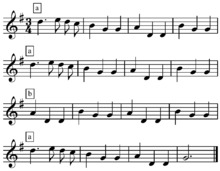- Did You Ever See a Lassie?
-
"Did You Ever See a Lassie?"
Roud #5040Written by Traditional Published 1895-1900 Written Scotland/USA Language English Form Nursery rhyme "Did You Ever See a Lassie?" is a folk song, nursery rhyme and singing game. It has a Roud Folk Song Index number of 5040.
Contents
Lyrics
Modern versions of the lyrics include:
- Did you ever see a lassie,
- A lassie, a lassie?
- Did you ever see a lassie,
- Go this way and that?
- Go this way and that way,
- Go this way and that way.
- Did you ever see a lassie,
- Go this way and that?
- Did you ever see a laddie,
- A laddie, a laddie?
- Did you ever see a laddie,
- Go this way and that?
- Go this way and that way,
- Go this way and that way.
- Did you ever see a laddie,
- Go this way and that?
Origins
The use of the terms "lassie" and "laddie" mean that this song is often attributed to possible origins in Scotland (by various forms of media; see "references" section), but it was first collected in the United States in the last decade of the nineteenth century and was not found in Great Britain until the mid-twentieth century. However, it can be surmised that the words to the song may have come from Scottish immigrants or Scottish-Americans because of the aforementioned terms.[2]
Along with "The More We Get Together", it is generally sung to the same tune as "Oh du lieber Augustin", a song written in Germany or Vienna in the late seventeenth century.[2]
As a game
The song is often accompanied by a circle singing game. Players form a circle and dance around one player. When they reach the end of the verse they stop, the single in the middle performs an action (such as Highland dancing), which everyone then imitates, before starting the verse again, often changing the single player to a boy, or a boy can join the center player - thus creating an extra verse in the song ("Did you ever see some children...").[3]
References in popular culture and children's media
The song is featured as one of the songs in WeeSing's Grandpa's Magical Toys, represented by the Laddie and Lassie characters (played by Caysie Torrey and David Lovelin), and is also one of the songs featured in the CD Wee Sing and Play as well, with the opening narration confirming that the words "lassie" and "laddie" attribute to Scotland (they mean "boy" and "girl" in Scots). The version heard on the Kidsongs album "My Favorite Kidsongs Collection" and the Kidsongs video I'd Like to Teach the World to Sing also confirms this with two extra verses about a kilt and a bagpipe. The scene in the video shows a pipe-and-drum band and several highland dancers performing a cross between the Highland Fling and the Seann Truibhas plus a circular sword dance as well.[4] The song has also been performed by The Wiggles, showing occasional movements of the Sailor's Hornpipe dance, a dance adapted from an English dance that is now performed more frequently in Scotland.[5]
References
- ^ Copland, Aaron & Slatkin, Leonard (2011). What to Listen for in Music,[page needed]. ISBN 9780451531766.
- ^ a b J. J. Fuld, The Book of World-famous Music: Classical, Popular, and Folk (Dover, 5th edn., 2000), p. 399.
- ^ A. S. Fraserae, Ye min' langsyne?: A pot-pourri of games, rhymes, and ploys of Scottish childhood (London: Routledge, 1975), p. 23.
- ^ "Did You Ever See a Lassie?" with extra verses
- ^ The Wiggles perform "Did You Ever See a Lassie?"
Categories:- Nursery rhymes
- Scottish folk songs
- Singing games
Wikimedia Foundation. 2010.

